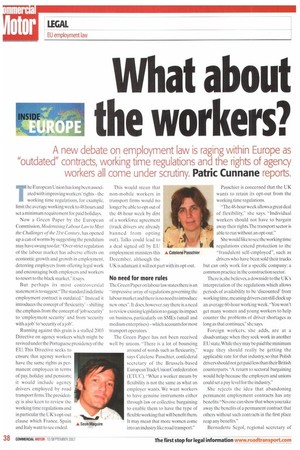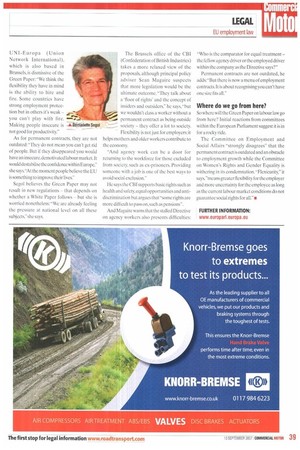What about the workers?
Page 38

Page 39

If you've noticed an error in this article please click here to report it so we can fix it.
A new debate on employment law is raging within Europe as "outdated" contracts, working time regulations and the rights of agency workers all come under scrutiny. Patric Cunnane reports.
The European Union has long been associated with improving workers' rights the working time regulations, for example. limit the average working week 10 48 hours and set a minimum requirement for paid holidays.
Now a Green Paper by the European Commission, Modernising Labour Law to Meet the Challenges of the 21st Century, has opened up a can of worms by suggesting the pendulum may have swung too far. "Over-strict regulation of the labour market has adverse effects on economic growth and growth in employment, deterring employers from offering legal work and encouraging both employers and workers to resort to the black market," it says.
But perhaps its most controversial statement is to suggest: "The standard indefinite employment contract is outdated." Instead it introduces the concept of Ilexicurity' — shifting the emphasis from the concept of lob security' to 'employment security and from 'security with a job' to 'security of a job'.
Running against this grain is a stalled 2003 Directive on agency workers which might be revived under the Portuguese presidency of the EU. This Directive seeks to ensure that agency workers have the same rights as permanent employees in terms of pay. holiday and pensions; it would include agency drivers employed by road transport firms.The presidency is also keen to review the working time regulations and in particular the UK's opt-out clause which France. Spain and Italy want to see ended. This would mean that non-mobile workers in transport firms would no longer be able to opt out of the 48-hour week by dint of a workforce agreement (truck drivers are already banned from opting out). Talks could lead to a deal signed off by EU employment ministers this A Catelene Passchiet December, although the UK is adamant it will not part with its opt-out.
No need for more rules
The Green Paper on labour law states there is an "impressive array of regulations governing the labour market and there is no need tointroduce new ones". It does, however, say there is a need to review existing legislation to gauge its impact on business, particularly on SMEs (small and medium enterprises)—which accounts for most transport operators.
The Green Paper has not been received well by unions. -There is a lot of bouncing around of words such as flexicurity," says Catelene Passehier, confederal secretary of the Brussels-based EuropeanTrade Union Confederation (ETUC). -What a worker means by flexibility is not the same as what an employer wants. We want workers to have genuine instruments either through law or collective bargaining to enable them to have the type of flexible working that will benefit them. It may mean that more women come into an industry like road transport. Passchier is concerned that the UK wants to retain its opt-out from the working time regulations.
-The 48-hour week allows a great deal of flexibility," she says. "Individual workers should not have to bargain away their rights.The transport sector is able to run without an opt-out."
She would like to see the working time regulations extend protection to the "fraudulent self-employed", such as drivers who have been sold their trucks but can only work for a specific company: a common practice in the construction sector.
There is, she believes, a downside to the UK's interpretation of the regulations which allows periods of availability to be 'discounted' from working time,meaning drivers can still clock up an average 60-hour working week. -You won't get many women and young workers to help counter the problems of driver shortages as long as that continues," she says.
Foreign workers, she adds, are at a disadvantage when they seek work in another EU state. While they may be paid the minimum wage they should really be getting the applicable rate for that industry, so that Polish drivers should not get paid less than their British counterparts. "A return to sectoral bargaining would help because the employers and unions could set a pay level for the industry."
She rejects the idea that abandoning permanent employment contracts has any benefits: "No one can show that when you take away the benefits of a permanent contract that others without such contracts in the first place reap any benefits.
Bernadette Segol, regional secretary of UNI-Europa (Union Network International), which is also based in Brussels, is dismissive of the Green Paper: "We think the flexibility they have in mind is the ability to hire and fire. Some countries have strong employment protection but in others it's weak you can't play with fire. Making people insecure is not good for productivity."
As for permanent contracts, they are not outdated: "They do not mean you can't get rid of people. But if they disappeared you would have an insecure, demotivated labour market. It would destabilise the confidence within Europe," she says, "At the moment people believe the EU is something to improve their lives."
Segol believes the Green Paper may not result in new regulations that depends on whether a White Paper follows but she is worried nonetheless: "We are already feeling the pressure at national level on all these subjects," she says. The Brussels office of the CBI (Confederation of British Industries) takes a more relaxed view of the proposals, although principal policy adviser Sean Maguire suspects that more legislation would be the ultimate outcome. "They talk about a 'floor of rights' and the concept of insiders and outsiders." he says, "but we wouldn't class a worker without a permanent contract as being outside society they offer a lot to society. Flexibility is not just for employers: it helps mothers and older workers contribute to the economy "And agency work can be a door for returning to the workforce for those excluded from society, such as ex-prisoners. Providing someone with a job is one of the best ways to avoid social exclusion."
He says the CBI supports basic rights such as health and safety, equal opportunities and antidiscrimination but argues that "some rights are more difficult to pass on, such as pensions".
And Maguire warns that the stalled Directive on agency workers also presents difficulties: -Who is the comparator for equal treatment the fellow agency driver or the employed driver within the company as the Directive says?"
Permanent contracts are not outdated, he adds:"But there is now a menu of employment contracts. It is about recognising you can't have one size fits all."
Where do we go from here?
So where will the Green Paper on labour law go from here? Initial reactions from committees within the European Parliament suggest it is in fora rocky ride.
The Committee on Employment and Social Affairs "strongly disagreesthat the permanent contract is outdated and an obstacle to employment growth while the Committee on Women's Rights and Gender Equality is withering in its condemnation. "Flexicurityit says,"means greater flexibility for the employer and more uncertainty for the employee as long as the current labour market conditions do not guarantee social rights for all." •
FURTHER INFORMATION: www.europarl.europa.eti




























































































































































































